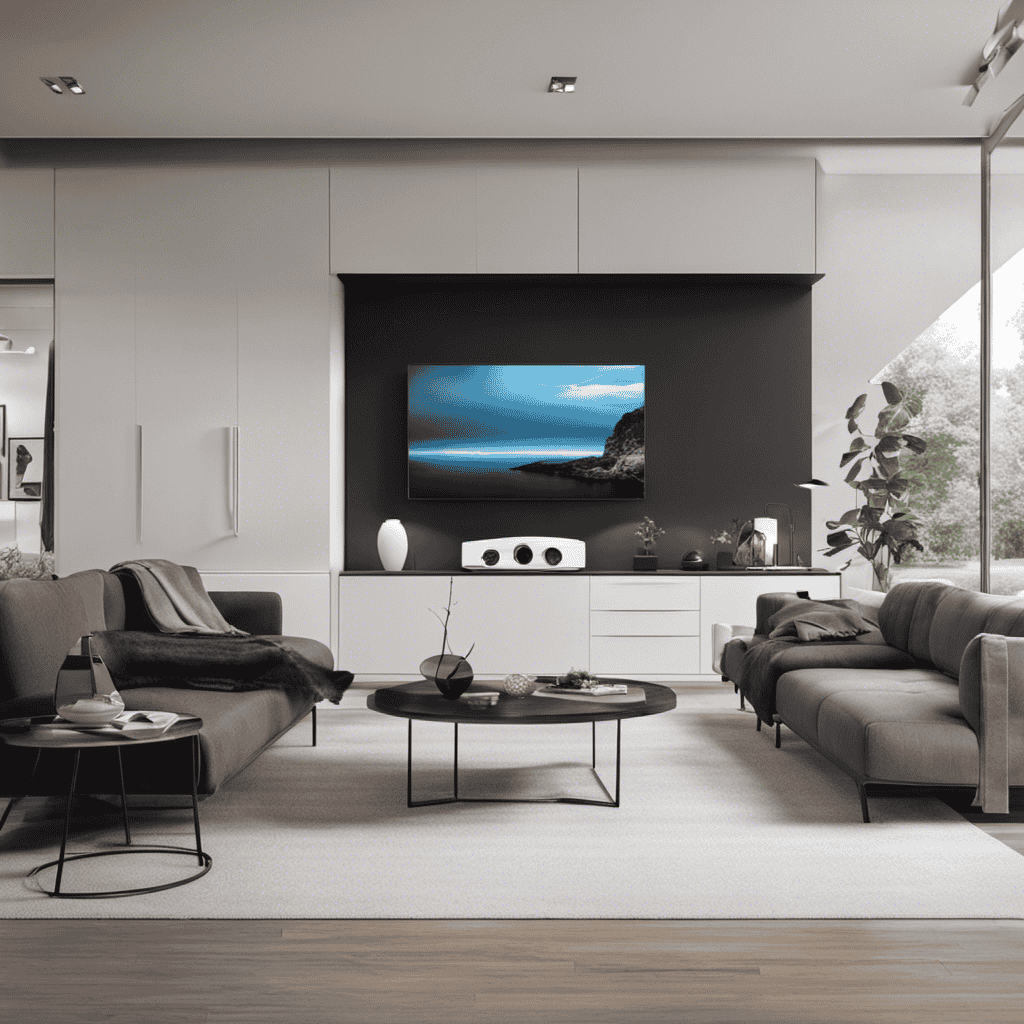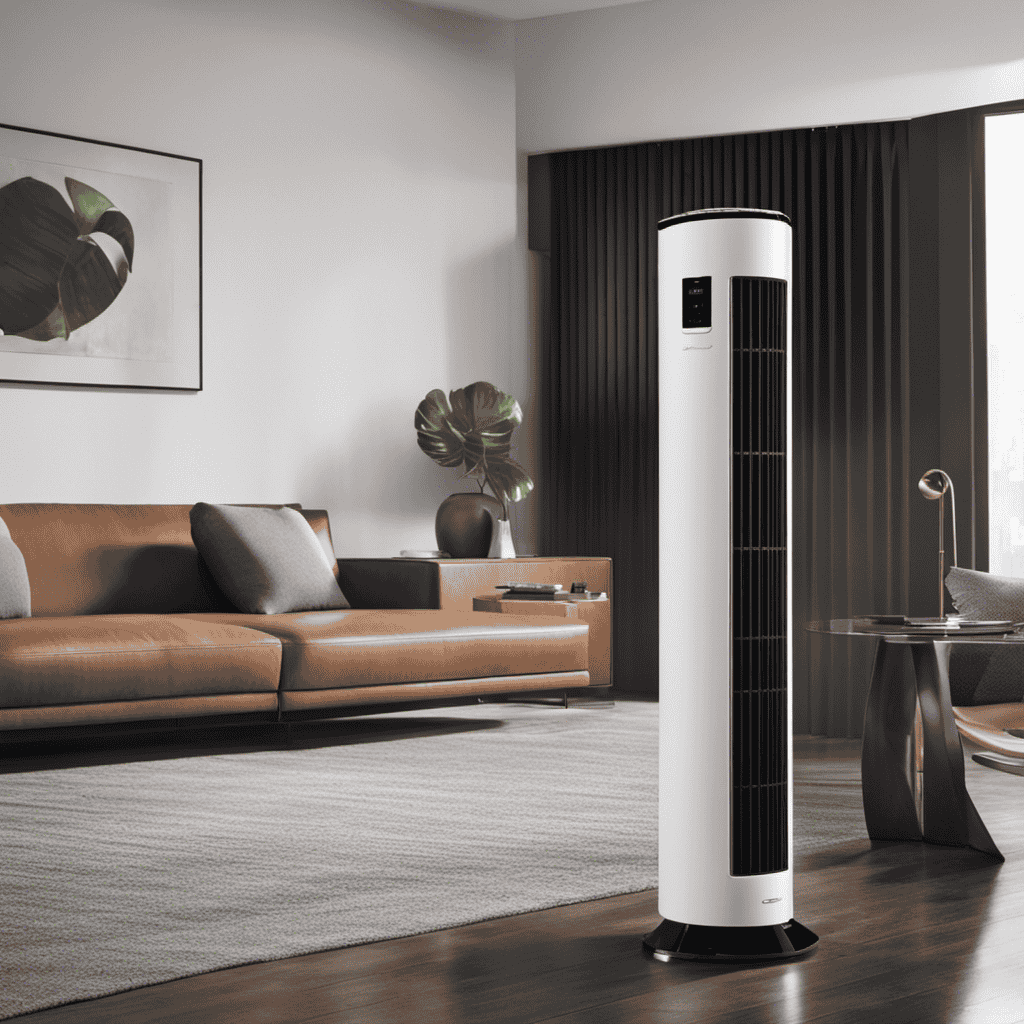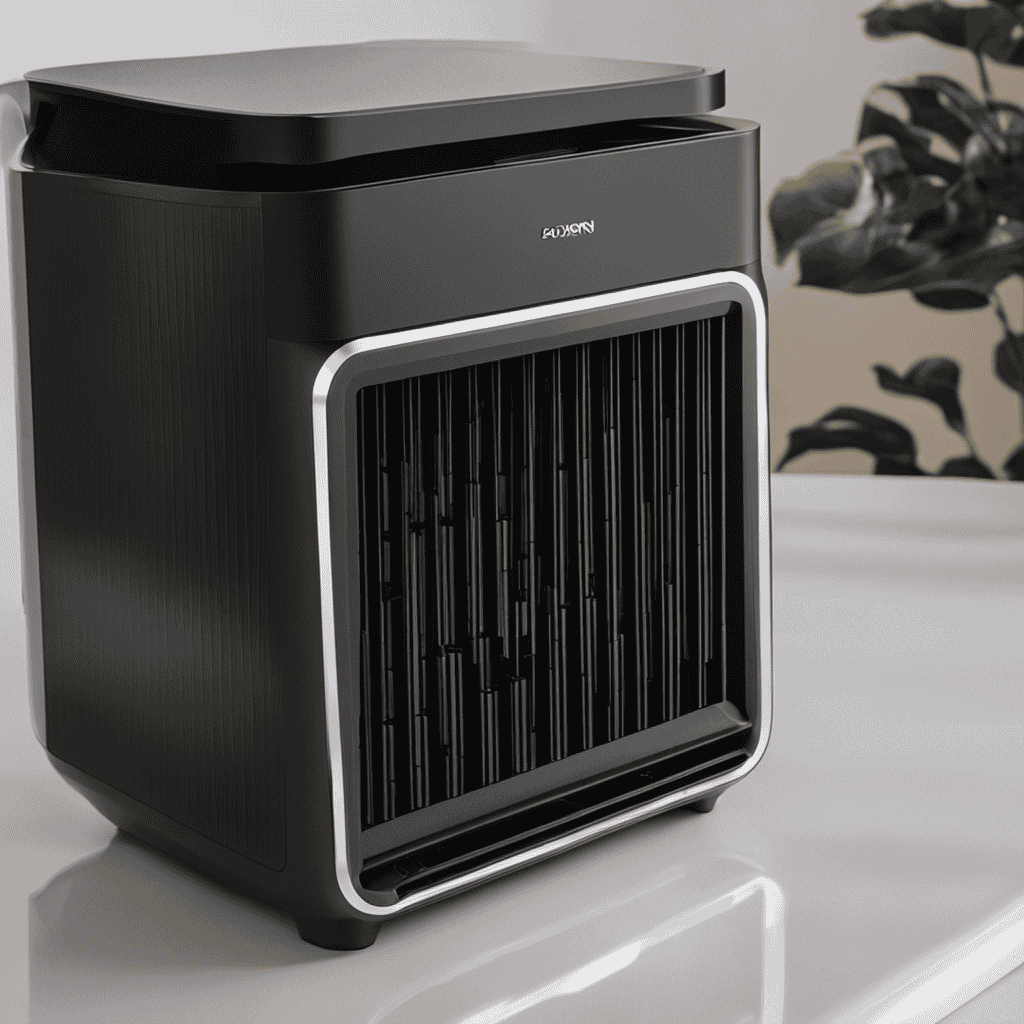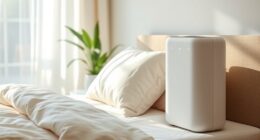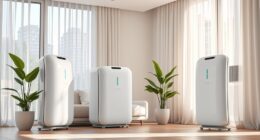As a person who appreciates clean, fresh air in my house, I recognize the significance of keeping my HEPA filter air purifier working efficiently.
Like the engine of a car, the HEPA filter is the powerhouse that keeps the air in our living spaces free from harmful pollutants.
In this article, I will delve into the topic of how often to change your HEPA filter, providing you with practical tips and information to ensure your air purifier performs at its best.
Let’s dive in!
Key Takeaways
- Regularly changing your HEPA filter improves overall air quality and ensures cleaner and fresher air in your home.
- The frequency of filter replacement depends on factors such as air quality in your area, usage of the air purifier, manufacturer’s recommendations, and regular cleaning and maintenance.
- Signs that indicate your HEPA filter needs changing include an increase in allergies or respiratory symptoms, a persistent musty odor, visible buildup of dust and debris on the filter, and the impact on health and overall well-being.
- Proper maintenance techniques for HEPA filters include vacuuming, washing with mild soap and water if washable, using an air compressor to blow away dust and particles, and following the manufacturer’s instructions for cleaning methods.
Benefits of Regularly Changing Your HEPA Filter
You’ll experience cleaner and fresher air in your home when you regularly change your HEPA filter. The benefits of regularly changing your HEPA filter cannot be overstated.
HEPA filters are designed to capture and remove small particles and allergens from the air, improving the overall air quality in your home. Over time, these filters can become clogged with dirt, dust, and other pollutants, reducing their effectiveness. By changing your HEPA filter regularly, you ensure that it continues to operate at its highest capacity, effectively trapping and removing harmful particles from the air.
This is especially important for individuals with allergies or respiratory conditions, as clean indoor air can significantly improve their quality of life. Additionally, regularly changing your HEPA filter can also help prolong the lifespan of your air purifier, saving you money in the long run.
Factors to Consider When Determining Filter Replacement Frequency
When determining how frequently to replace your filter, it’s important to consider various factors. Proper maintenance techniques and following these tips can help extend the lifespan of your filter:
- Air Quality: If you live in an area with high pollution levels or have pets, you may need to replace your filter more frequently.
- Usage: If your air purifier is running continuously or in a heavily used space, the filter may need to be replaced more often.
- Filter Type: Different filters have different lifespans. Check the manufacturer’s recommendations for your specific model.
To extend the lifespan of your filter, you can:
- Regularly clean and vacuum your air purifier to prevent dust buildup.
- Keep windows and doors closed to reduce the amount of outside contaminants entering your home.
- Consider using a pre-filter to capture larger particles and prolong the life of your main filter.
Signs That Indicate Your HEPA Filter Needs Changing
One way to determine if your HEPA filter needs changing is by noticing a decrease in the quality of the air in your home. As a homeowner, it is essential to be aware of the warning signs that indicate the need for a filter replacement.
These warning signs include an increase in allergies or respiratory symptoms, a persistent musty odor, or a visible buildup of dust and debris on the filter itself. It is important to prioritize clean air in your home, as it can greatly impact your health and overall well-being. Breathing in contaminated air can lead to respiratory issues and other health problems.
To maintain clean air, it is crucial to change your HEPA filter regularly. Now, let’s move on to the step-by-step guide to changing your HEPA filter.
Step-by-Step Guide to Changing Your HEPA Filter
To start changing your HEPA filter, first, make sure you have the necessary tools and a replacement filter on hand. You’ll need a screwdriver, gloves, and a trash bag for proper disposal. It’s important to follow the manufacturer’s instructions for your specific air purifier model.
Here are the steps to guide you through the process:
-
Turn off the air purifier and unplug it from the power source.
-
Locate the filter compartment and remove the cover using the screwdriver.
-
Take out the old HEPA filter and place it in the trash bag for proper disposal methods.
-
Open the packaging of the new filter and remove any protective coverings.
-
Insert the new filter into the compartment, making sure it fits securely.
-
Put the cover back on and tighten the screws with the screwdriver.
-
Plug in the air purifier and turn it on to test the new filter.
When it comes to recommended filter brands, popular options include Honeywell, Blueair, and Coway. These brands are known for their high-quality filters that effectively capture airborne particles and improve indoor air quality.
Common Mistakes to Avoid When Replacing Your HEPA Filter
When it comes to maintaining the efficiency of your air purifier, two key factors to consider are the proper replacement frequency and the compatibility of the filter with your specific air purifier model.
The frequency at which you should replace your HEPA filter depends on various factors, such as the manufacturer’s recommendations and the air quality in your environment.
It is crucial to select a replacement filter that is compatible with your air purifier model to ensure optimal performance and filtration efficiency.
Proper Replacement Frequency
You should regularly replace your HEPA filter in your air purifier to ensure its efficiency. Neglecting to change the filter can lead to decreased performance and poor air quality.
The frequency of filter replacement depends on several factors that can affect its efficiency. These factors include:
- Usage: If you use your air purifier frequently or in a highly polluted area, the filter may need to be replaced more often.
- Air quality: If you live in an area with high levels of pollution or allergens, the filter may become clogged faster and require more frequent replacement.
- Filter type: Different filters have varying lifespans. Some may need to be replaced every 6 months, while others can last up to 2 years.
When it comes to cost-effective filter replacement options, consider the following:
- Generic filters: Look for generic filters that are compatible with your air purifier. They are often cheaper than branded filters but still offer similar performance.
- Bulk purchasing: Buying filters in bulk can often save you money compared to purchasing them individually.
- Filter maintenance: Regularly cleaning and maintaining your filter can extend its lifespan, reducing the need for frequent replacement.
Compatibility With Air Purifier
Ensure that the filter you choose is compatible with your specific model of air purifier for optimal performance. When it comes to air purifier maintenance, choosing the right filter is crucial.
The compatibility between the filter and your air purifier ensures that it functions efficiently and effectively, providing you with clean and healthy air. To determine the compatibility, refer to your air purifier’s user manual or consult the manufacturer’s website for a list of compatible filters.
It is important to note that not all filters are created equal. Different models require different types of filters, such as HEPA filters or activated carbon filters. Choosing the right filter guarantees that it will fit properly and function as intended, prolonging the lifespan of your air purifier and ensuring that it continues to purify the air in your home effectively.
Tips for Extending the Lifespan of Your HEPA Filter
When it comes to maintaining the lifespan of your HEPA filter, there are several key points to keep in mind.
First, it is important to follow proper maintenance techniques, such as regularly cleaning and vacuuming the filter to remove any trapped particles.
Additionally, understanding the recommended filter replacement frequency is crucial in ensuring optimal performance and air quality.
Lastly, there are ways to prolong the lifespan of your filter, such as avoiding exposure to excessive moisture or pollutants and storing it in a clean and dry environment.
Proper Maintenance Techniques
Regularly replacing the HEPA filter is crucial for maintaining the effectiveness of your air purifier. To ensure proper maintenance, here are some techniques and cleaning methods to follow:
-
Vacuuming: Gently vacuum the surface of the filter to remove any loose dust or debris. Avoid using excessive force to prevent damage.
-
Washing: Some HEPA filters are washable. Follow the manufacturer’s instructions and use mild soap and water to clean the filter. Allow it to dry completely before reinstalling.
-
Air Compressor: If washing is not an option, you can use an air compressor to blow away dust and particles from the filter. Use low pressure to avoid damaging the filter.
By regularly cleaning and maintaining your HEPA filter, you can prolong its lifespan and ensure optimal performance. However, it is important to note that cleaning methods might vary depending on the specific air purifier model and manufacturer guidelines.
Now, let’s discuss the frequency at which you should replace your HEPA filter.
Filter Replacement Frequency
It’s important to note that the frequency of replacing the HEPA filter may vary depending on the specific model and manufacturer guidelines. Several factors can affect the performance of a HEPA filter, including the air quality in your environment, the size of the space being filtered, and the amount of contaminants present. To give you a better understanding, here’s a cost comparison of different filters commonly used in air purifiers:
| Filter Type | Average Lifespan | Cost |
|---|---|---|
| HEPA | 6-12 months | $20 |
| Carbon | 3-6 months | $15 |
| Pre-filter | 1-3 months | $10 |
As you can see, HEPA filters generally have a longer lifespan compared to carbon and pre-filters, which may need to be replaced more frequently. However, it’s important to follow the manufacturer’s guidelines to ensure optimal performance and maintain clean air in your space.
Prolonging Filter Lifespan
You can extend the lifespan of your filters by keeping your environment clean and reducing the amount of contaminants present. This will not only save you money by prolonging filter effectiveness but also maximize filter performance in your air purifier.
Here are three important tips to help you achieve this:
-
Regularly clean your air purifier: Dust and debris can accumulate on the exterior and internal components of your air purifier, reducing its efficiency. Use a soft cloth or brush to gently clean the surfaces and remove any dirt or particles.
-
Vacuum and dust frequently: Keeping your home or office clean will minimize the amount of pollutants that enter your air purifier. Vacuuming carpets, dusting surfaces, and regularly changing bedding can significantly reduce the load on your filters.
-
Control the source of contaminants: Eliminate or reduce the presence of smoke, pet dander, pollen, and other allergens in your environment. This can be achieved by using proper ventilation, keeping windows closed during high pollen seasons, and using air purifiers in areas with high pollutant levels.
Frequently Asked Questions
Can I Clean My HEPA Filter Instead of Replacing It?
Yes, cleaning the HEPA filter can improve its cleaning efficiency and longevity benefits. However, it’s important to note that not all HEPA filters are washable. Refer to the manufacturer’s instructions to determine if your filter can be cleaned.
How Much Does a Replacement HEPA Filter Typically Cost?
I clean my HEPA filter every three months to ensure optimal performance. To extend its lifespan, I also vacuum it regularly and keep the air purifier in a clean environment.
Can I Use a Generic Filter Instead of the Manufacturer-Recommended One?
I always change my air purifier’s HEPA filter when it’s recommended by the manufacturer. Using the manufacturer-recommended filter ensures optimal performance and efficiency, which is essential for removing particles and improving indoor air quality.
Are There Any Health Risks Associated With Not Changing the HEPA Filter Regularly?
Neglecting to change the HEPA filter regularly can lead to adverse health consequences. The accumulated pollutants can circulate in the air, causing respiratory issues and allergies. Regular filter changes are vital for maintaining optimal indoor air quality.
Is It Possible to Overuse or Change the HEPA Filter Too Frequently?
It is possible to overuse or change the HEPA filter too frequently. However, regularly changing the filter ensures its effectiveness in removing airborne particles and maintaining good indoor air quality.
Conclusion
In conclusion, taking care of your HEPA filter is like tending to a garden. Just as you need to regularly prune and fertilize your plants to keep them healthy, you must also change your HEPA filter to maintain clean and fresh air in your home.
By following the steps outlined in this article, you can ensure that your filter is always in top condition and working effectively. Remember, a well-maintained filter is the key to breathing easy and enjoying a healthier living environment.
So, don’t neglect your filter – give it the attention it deserves and reap the benefits!
